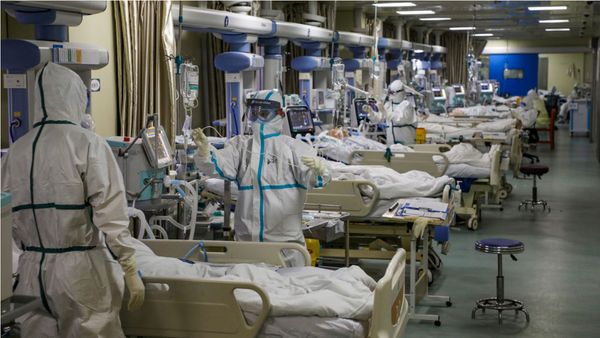
Antidepressants work – some more effectively than others – in treating depression, according to authors of a groundbreaking study which doctors hope will finally put to rest doubts about the controversial medicine.
Millions more people around the world should be prescribed pills or offered talking therapies, which work equally well for moderate to severe depression, say the doctors, noting that just one in six people receive proper treatment in the rich world – and one in 27 in the developing world.
If cancer or heart patients suffered this level of under-treatment, there would be a public outcry, they say.
“Depression is the single largest contributor to global disability that we have – a massive challenge for humankind,” said John Geddes, professor of epidemiological psychiatry at Oxford University. It affects around 350 million people worldwide and instances rose almost 20% from 2005-2015.
“Antidepressants are an effective tool for depression. Untreated depression is a huge problem because of the burden to society,” said Andrea Cipriani of the NIHR Oxford Health Biomedical Research Centre, who led the study.
In the UK, Geddes said “it is likely that at least one million more people per year should have access to effective treatment for depression, either drugs or psychotherapy. The choice will need to be made by doctor and patient.”
The debate over antidepressants has unfortunately often been ideological, said Cipriani. Some doctors and patients have doubts over whether they work at all and point to the big placebo effect – in trials, those given dummy pills also improve to some degree. Some people suspect drug companies of fiddling trial results. Some patients simply do not want to take pills for a mental health condition.
The study published in the Lancet took six years, Cipriani said, and included all the published and unpublished data that the scientists could find. It was carried out by a team of international experts. They looked at results after eight weeks of more than 500 trials involving either a drug versus placebo or comparing two different medicines.
The most famous antidepressant of them all, Prozac – now out of patent and known by its generic name, fluoxetine – was one of the least effective but best tolerated, measured by a low drop-out rate in the trials or fewer side-effects reported. The most effective of the drugs was amitriptyline, which was the sixth best tolerated.
In a commentary in the journal, Sagar Parikh from the University of Michigan in the USA and Sidney Kennedy from the University of Toronto in Canada pointed out that three drugs scored best for efficacy and tolerability: agomelatine, escitalopram, and vortioxetine. Three others scored particularly poorly: fluvoxamine, reboxetine, and trazodone. The first three “might be considered first choice” by doctors, they write, although the two most effective drugs – amitriptyline and venlafaxine – might still be first choice for severe depression.
But Cipriani said any of the drugs might still have their uses. The trial data cannot show which drug would be likely to work best for any one individual.
Antidepressants and psychological therapies – of which the most frequently used is CBT (cognitive behaviour therapy) – have similar success rates. Around 60% of people respond by about two months to the drugs with about a 50% reduction in their symptoms - an improvement in mood, better sleep and so on. But, he said, “about 80% of people stop antidepressants within a month”.
New treatments are badly needed, the experts say. Most of the drugs in the study are known as SSRIs, which are thought to work by increasing levels of a chemical messenger called serotonin in the brain, but nobody knows for certain. “We don’t have any very precise treatments for depression at this point in time,” said Geddes.
However, the doubts and controversy over antidepressants, allied to the difficulties in discovering new neurological drugs, have led to the drug companies quitting a field that once – after the launch of Prozac – looked likely to be very lucrative for them. “It is a massive problem that the industry has pulled out because they found this area very challenging to work in,” said Geddes.
Other experts said the study was of major importance. Professor Carmine Pariante, spokesperson for the Royal College of Psychiatrists, said the analysis “finally puts to bed the controversy on antidepressants, clearly showing that these drugs do work in lifting mood and helping most people with depression. Importantly, the paper analyses unpublished data held by pharmaceutical companies, and shows that the funding of studies by these companies does not influence the result, thus confirming that the clinical usefulness of these drugs is not affected by pharma-sponsored spin.”
Dr James Warner, reader in psychiatry at Imperial College London, said: “This rigorous study confirms that antidepressants have an important place in the treatment of depression. Depression causes misery to countless thousands every year and this study adds to the existing evidence that effective treatments are available.”
Prof Helen Stokes-Lampard, chair of the Royal College of GPs, said taking antidepressants was frequently portrayed as a negative thing “but this in itself can add to the unfortunate stigma that sometimes exists around people with mental health conditions”.
The research should reassure patients and doctors, she said. “Depression is a significant mental illness which, if left untreated or unmanaged, can cause a huge amount of distress for a patient, their family and friends. It should never be swept under the carpet or ignored.”
In the UK, Samaritans can be contacted on 116 123. In the US, the National Suicide Prevention Lifeline is 1-800-273-8255. In Australia, the crisis support service Lifeline is on 13 11 14. Other international suicide helplines can be found at www.befrienders.org.







